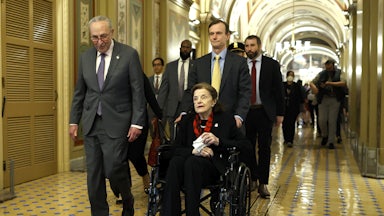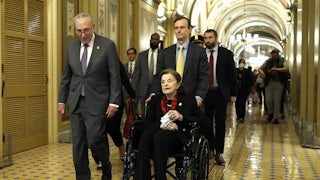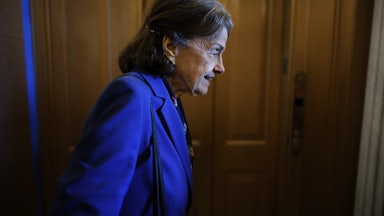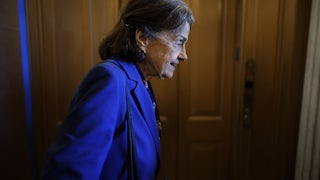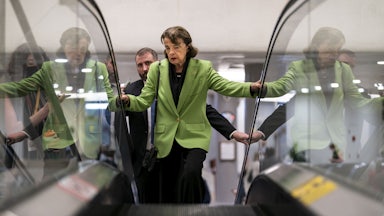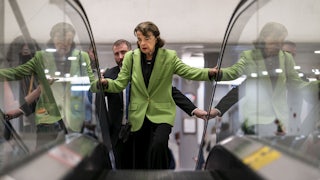Elderly lawmakers are nothing new in Washington. Strom Thurmond didn’t retire until he was 100; Robert Byrd was still in office when he died at 92. By those standards, Dianne Feinstein, who will turn 90 this month, is practically a youngster. But after her return to the Senate this spring following illness, questions about her ability to serve began to grow more frequent. On episode 69 of The Politics of Everything, co-hosts Laura Marsh and Alex Pareene discuss Feinstein’s storied career—and the long-standing reluctance among senators to develop plans for succession within an institution that rewards seniority above almost all else.
[audio] Feinstein: I haven’t been gone, I’ve been working. Reporter: You’ve been working from home, is what you’re saying? Feinstein: No, I’ve been here. I’ve been voting. Please … either know or don’t know.
Laura Marsh: In 1992, California voters sent two women to the United States Senate for the first time in state history. One was Barbara Boxer, the other was Dianne Feinstein. Following their election, Boxer says Feinstein sat her down and told her: “You’ve got to stick with this. The longer you stay, the better you’ll feel, the more you’ll get done.”
Alex Pareene: Boxer would serve in the Senate for 24 years, retiring in 2017. Feinstein, who is seven years older than Boxer, ran for reelection the following year. This will be her final term, but she’s not exactly spending it feeling good or getting stuff done.
Laura: A nasty bout of shingles and encephalitis kept Feinstein away from Washington for months, stalling President Joe Biden’s effort to restock the courts with democratic judges. Her health problems came after years of reporting on Feinstein’s declining faculties.
Alex: Dianne Feinstein is not the first senator to remain in office despite age-related infirmities. Congress seems to be a comfortable place to get old, and senescence seems to be no barrier to serving in Congress, in fact, if it weren’t for those pesky floor votes and committee hearings.
Laura: Today on the show, we are asking why Dianne Feinstein can’t quit, why her party didn’t make her, and whether her nonretirement is just a preview of the coming decline of a Congress that just keeps getting older. I’m Laura Marsh.
Alex: And I’m Alex Pareene.
Laura: This is The Politics of Everything.
Laura: Last month, Dianne Feinstein returned to the Senate floor after an absence of several months during which time Senate Democrats were hamstrung in their efforts to confirm judges among other pieces of business. Her physical frailty was evident and her cognitive decline was highlighted in a conversation with journalists in which she didn’t recall her own absence from Capitol Hill. Ben Oreskes is a reporter for the Los Angeles Times. His conversation with Feinstein and May went viral. Ben, welcome to the show.
Benjamin Oreskes: Hi guys.
Laura: You spoke with Dianne Feinstein. How did that conversation go?
Ben: It was a conversation that didn’t last more than a minute. It occurred after she had voted on the Senate floor and the entrances and exits to the Senate are a maze. And her and I and another reporter met each other at the elevator. She’d come out, and during that conversation, I asked her what it was like to be back and what she had heard from her colleagues, her well-wishers. People were really happy she had returned and she said, “I haven’t been gone, I’ve been voting.” And I responded, you mean like you’ve been working from home? And she said, No, do your homework or something to that effect, I’ve been here, I’ve been voting. Several of my colleagues who have dealt with her for decades pointed out that sharpness is a very quintessential Feinstein behavior.
Laura: Is there any way to interpret what she said is making sense?
Ben: You know, she had been back for about a week at that point. Maybe she thought I was talking about that week. We were chasing her and several of her staff who were doing their best to block her from us. Maybe she misunderstood me. But after the incident, I sent the audio to her staff. I didn’t hear anything or I didn’t at least hear a clarification. With that in mind, it felt only fair to Californians, to our readers to put this out in the world and let them hear it, analyze it, make sense of it.
Alex: I think as much as the comments themselves were newsworthy, I think the context is important to establish too. You’re a California-based reporter, right? Correct me if I’m wrong, you had to go to Washington and, as you say, almost chased her down to get access to her.
Ben: Yeah, I mean, she had been gone from work for several months. In that period of time, we would get these polished statements from her press account, talking about how she’s doing the business of government, she’s at home recovering and talking to her staff daily. But no one had seen a photo of her. No one had heard from her doctors. And I think it’s worth contrasting this with a person like John Fetterman who was absent as well during this period of time. He was diagnosed with clinical depression and had spent some time in the hospital. Both of their absence together made the work of government really hard. But during this time, we also heard a lot from Federman. There were photos of him that were released. His staff went out of their way to really show what his recovery looked like. This was very different.
Laura: Is it quite rare to have a conversation with her face to face like that?
Ben: Yes. I’m going to bungle the exact number of interviews she’s done in the last five or six years, but it’s like one or two. During the 2018 election, she did, I believe, one debate during that campaign, and it was intensely negotiated how many she would do, and she did very little press. In the intervening years, she’s done even less. She’s hard to find, and there’s been ample amount of reporting that has gone into some amount of detail, mostly using anonymous sources, about how she has been unable to keep up a busy schedule, remember things. That doesn’t mean she can’t do the work of government. But again, that’s an interesting debate on what constitutes being a senator.
Laura: It seems the bare minimum is showing up for votes, and interacting with your constituents to some extent and being accountable to them.
Ben: That’s a question that people have different answers to. I think her view of it was: I was sick, I’ve gotten to a place where my doctor said I could travel. And then I got on a plane and came back to D.C. and I’ve started voting again, and I’ve been helping approve judges. But beyond that, she’s not been out in the open, she’s not been going to hearings, she’s not been communicating in public. Her office puts out statements, has even put in legislation. The grip and grin part of politics, she’s not doing now.
Alex: What is it like interacting with her office? Are they responsive?
Ben: It depends. She is well known for having a very competent professional staff. The joke in California was that we had a great junior senator and a very good senior senator’s staff as she has been in less public forums. I think that’s a bit unfair to her in some ways, because the staff of senators does a lot of the heavy lifting. Her office has not been terribly responsive when it came to the mechanics of what she was doing. And at the same time, her office isn’t disputing anything we’ve said.
Laura: I think the thing that’s interesting is lots of people point out that the team of people around an elected official is really important. But one would expect the elected official to be the person who sets the agenda and ultimately decides on values, priorities, like what we’re really interested in doing. And I think the question about Dianne Feinstein is: Is she aware enough of what’s going on around her to be in a position to do that?
Ben: It’s a really good question. I was watching her staff as she voted and she was getting a lot of counsel about how to take certain votes in a committee hearing that I was at. At the same time I think some senators would even acknowledge that they’re told how to vote on the many, many things that they do. But if you look at a recent poll we just put out with the Berkeley Institute for Governmental Studies, Californians don’t have confidence in her right now. Two-thirds of them say that her recent health scare means she’s not fit to serve. About in the forties said they think she should resign. So it’s clear that she is suffering from a crisis of faith among people who voted for her in big numbers in recent years. They have lost confidence in her ability to do the job.
Alex: I want to ask, without asking you to speculate too much, but has she been aided in some way in almost deceiving voters about her abilities? Have her allies… Were they making her seem more competent than perhaps she actually was during the period when she was before the voters again?
Ben: The question you’re asking captures why it was important to talk to her, because there was no intermediary. Just being able to really lay eyes on someone and then contrast that with what you had seen in other contexts made me feel more confident in some of the reporting about how healthy she was. I come back to a story that Tal Kopan wrote in the San Francisco Chronicle last year. It was a really deep dive into these questions and how her colleagues didn’t have confidence in her necessarily. But again, this moment with her absence and then our reporting and other reporting from outlets like Slate, and again, some of the photos that my colleague Kent Nishimura took of her, you’ve got to see it and hear it to really appreciate how much she has changed even since 2018, maybe.
Alex: I guess we can’t know precisely why she has resisted resigning. But politically, what is the calculus for California Democrats in terms of her staying on, in terms of her leaving?
Ben: I would encourage your listeners to go check out an interview my colleague Mark Barabak did with Feinstein’s biographer, Jerry Roberts. This is a person who’s fiercely independent, a person who stood up to the federal government in the context of the torture report. This is a woman who has been a trailblazer and her legacy is based on that independence. I think that that sense of, I can still do this, is maybe what’s driving her right now. On the politics, it is a terribly difficult situation right now, and much of that has to do with the slim margins in the Senate. This seat can’t be vacant. They need a majority on the Judiciary Committee, and they need her there to take these votes.
In California though, it puts Gavin Newsom, our governor, in just a political headlock of sorts because of something he promised several years ago. When Kamala Harris became vice president, he appointed a political ally and friend of his, Alex Padilla, to be the senator to replace Harris. This is, I think, the first Latino senator in California’s history. A huge moment. At that moment, there was a lot of frustration, agitation about the only Black female senator leaving. Gavin committed to appointing a Black woman if another seat came open. And the challenge there is that there actually is a Black woman running to replace Feinstein, who, just a reminder, has said she’s not going to run for another term. So you have three prominent Democrats, you have Barbara Lee from Oakland, you have Katie Porter from Irvine, Adam Schiff from Burbank. All members of Congress. Only one of them is Black. Only two of them are women, but only one of them is a black woman. And a lot of people are worried that in an open primary, which many people are very excited to vote in—
Alex: There hasn’t been an open primary in a very long time.
Ben: —exactly. But a lot of people feel like if Barbara Lee were to be appointed to the seat, which many people are advocating for, then it would put the thumb on the scales.
Alex: Not to mention Barbara Lee is herself 70-something years old.
Ben: Seventy-six.
Alex: Seventy-six years old. Right. Which, in comparison with certain other senators…
Ben: She’s still getting carded at the door. I think that one of the other things hanging over this question is that Barbara Lee is, by some distance, third or fourth in the polls. She is working from a disadvantage in terms of fundraising, and in a place like California where getting advertising is incredibly expensive and it’s a huge state full of lots of media markets, you’re looking for advantages and being the senator could be a huge one for her.
Laura: The fact that a situation like this would come up seems predictable. If someone just keeps running for reelection into their very old age, it’s likely that they will maybe need to be replaced in between election cycles and then you’re going to have these really difficult decisions, whereas if she had decided not to run in 2018, this would’ve already been sorted out democratically.
Ben: I think people would argue that it was sorted out democratically in 2018. She won. I’m not trying to be glib about that.
Laura: Well, I get the succession question would’ve been “Who should be the senator that won Dianne Feinstein by?” but “Who’s going to come next?”
Ben: But, with that in mind, the California Democratic Party is an incredibly important party. It’s much more, I would say, liberal than than where the median voter is. And in 2018, they actually didn’t endorse Dianne Feinstein. I bring that up because in that race, a lot of the institutional heft was still behind Feinstein. And she won about eight or nine points. So there have been efforts at having this conversation, but people were unwilling to really stick their neck out there and say it’s time for you to go.
Alex: Yeah. Ben, thank you so much for taking the time to talk to us today.
Ben: Of course, guys. Thank you.
Laura: Read Ben Oreskes’s article, “Feinstein responds to questions about her absence from D.C.,” at latimes.com.
Alex: After the break, we’ll talk in more detail about Feinstein’s career and about how the particular circumstances of her situation underscore the dysfunction on Capitol Hill.
Alex: Dianne Feinstein was first elected to the Senate in 1992. Last year, she officially became the longest serving female senator in U.S. history. Her legislative record is one of exceptional accomplishment, but questions about her health have dogged her since even before her most recent reelection campaign in 2018. Rebecca Traister profiled Feinstein for New York Magazine in 2022, and she joins us now to talk about the significance of her career, the tradition of aged legislators on Capitol Hill, and why Feinstein’s situation is uniquely precarious for Democrats. Rebecca, thanks for talking to us.
Rebecca Traister: I am happy to be here.
Alex: So Feinstein was part of this whole slate of women famously elected to the Senate in 1992. What kind of politician was she when she got there?
Rebecca: Well, I reported this long feature profile of her a year ago in 2022, and she’s been the center Californian, even compared to Barbara Boxer, who was her peer who was elected in 1992. Boxer was definitely slightly to the left of Feinstein, but I came to understand Feinstein through that reporting as not even being ideologically centered. She has prized the institution of the Senate and its rules and its practices and its decorum above ideological commitments, and that is also what defined her time as mayor in San Francisco, a job she held for a long time.
Alex: More so than being a committed centrist, it’s almost like it’s institutionalism more than anything else.
Rebecca: Yeah, the centrism is so interesting because it’s obviously real, right? Dianne Feinstein is not a leftist. Dianne Feinstein is to the right of many, even of her middle democratic peers. But actually then there are these weird moments like where she’s actually… the CIA torture stuff, which is really important. I was so surprised when I was doing this reporting to talk to some real progressives in San Francisco who, even though they are very much to the left of Feinstein, had a rugged appreciation for various things about Feinstein’s political history, including her handling of AIDS as mayor in San Francisco. And there was a lot of criticism of that too, by the way, I want to be clear, but she was worlds ahead of Ed Koch in New York City in the same period. So that even by comparison within her party, there were instances where she surprised you. She has been both for and against the death penalty. As a young woman, she was very interested in prison reform. Since then, she’s been huge on building the criminal justice system. I really don’t think that there’s an ideology that guides her. I think it is about the best ways to maintain control.
Alex: That would seem to lead to the situation we find ourselves in, as unwillingness to seed control maybe.
Rebecca: I mean, I wrote this a year ago, and already there was a lot of reporting about the deterioration in terms of her memory. I had a conversation with her in which she repeated things and asked for help from her aids and was clearly reading from cards. She was not herself in full control conversationally. We are now, a year later, she is still serving in the Senate. She has, at this point, said she will not seek another term, which I mean is a really low bar to clear at this point. But part of what I came to when I was writing about her is how the position that she has gotten herself into—and extension the country and the Democratic party—is symptomatic of so many of the ways that the institutions are broken. And it’s fascinating to me about Feinstein in particular, that she has this belief in the institutions and yet in the decades that she has been in power and grown ever more senior within the institution of the Senate, the democratic mechanisms are falling apart at the seams.
Alex: It’s a little bit funny because it’s really hard to say this with a straight face, but the Senate was the world’s greatest deliberative body. That’s what it calls itself. But I think it’s also been really plainly broken for many years now.
Rebecca: Right. Again, I haven’t been deeply immersed in this as a reporter in these past few weeks as there’s been a lot of coverage about why Feinstein may or may not be able to leave at this point, because the big problem is her place on the Senate Judiciary Committee, which is absolutely crucial, so that the president can actually appoint judges who then get approved. And if Democrats give up that seat, it is not clear that the Republicans won’t hold it hostage. The idea that it has come down to this, that “these are the stakes, and therefore we have to prop this woman up”—
Alex: Right. It’s sort of perverse. Because it’s the fact that I didn’t leave when I should have means now I can’t leave because you may not be able to replace me on the committee.
Rebecca: Right.
Laura: Do you see a broader trend there? Cause it feels like a replay of what happened with Ruth Bader Ginsburg, where she didn’t resign when she had the chance to be replaced with someone who was politically similar, and then that seat was lost.
Rebecca: Yeah. Both instances are indicative of the institutional degradation happening that means that these decisions of individual people wind up being so tremendously important.
Laura: So I think she’s been in the Senate for long enough and seen enough of these changes happening in the last few years that she should have known that this could happen.
Rebecca: Well, so there’s where maybe some of the deterioration comes into play. Because one of the moments where it became clear to me, and I think it was clear to a lot of people in 2018, but it was so clear to me in the fall of 2020, after the rushed confirmation of Amy Coney Barrett, when she very famously hugged Lindsey Graham on the Senate Judiciary Committee and said that’s the best set of hearings I’ve ever done. That was a moment where you were like, no, she’s actually not aware of what’s at stake.
Alex: Yeah. Did you get a chance to ask her about that? Cause I wanted to talk about the circumstances of your actual phone call with her.
Rebecca: Hmm. The phone call was not long. And it was a very surprise phone call. I did not expect to talk to her for the story. Though I tried for months and got no response for a long time, and then very suddenly at the last minute, her staff told me that she would like to talk to me. It was in May of 2022. And so it was in between the leak of the Dobbs decision and the actual decision in June. And one of the things that I had tracked in my reporting was her history around abortion. Because as a young woman, she’d served on the parole and sentencing board in California where she actually sentenced abortion providers to prison, which was fascinating to me because her pro-choice politics had always been very much a part of her brand. And I asked her about that and then I asked her about the upcoming overturn of Roe, which is very clear at that point to anybody—there had been the leak of the decision—and she seemed not really aware of the impending reality.
Alex: Yeah. But it reminds me of one of the almost unintentionally funny defenses of Feinstein that you heard before; basically that, Well, it’s just not fair that these other senators got to serve until they were 100 despite being feeble and not all there. We let Strom Thurmond and Robert Byrd do it. So why can’t Feinstein?
Rebecca: Look, I have written for a long time from a feminist perspective, and I am extremely sensitive to the kinds of questions that are asked of women that are not asked of men. I do not buy that when it comes to Feinstein. It is simply not true that people did not urge Strom Thurmond to retire. a) You can go back and you can find “Time to End the Strom Thurmond Charade,” Chicago Tribune, 2001. Thurman should retire, 1996.
Alex: He had years left at that point.
Rebecca: He was a spring chicken in 1996.
Laura: But is it that it’s more consequential now because when he was in the Senate, it wasn’t divided in the same way that it is now?
Rebecca: Yeah, but look, the nation is at a precipice, democracy is unraveling. The planet is burning, but the truth is these things were always consequential. It is the repetition of them over and over again for generations that builds up the patterns that leave us where we are right now. Secondly, the feminist defense of Dianne Feinstein and, in fact, a push of people into politics who are different from the generations who came before, either in terms of identity or ideology, is so often rooted in the idea that things can be different moving forward. And so when it comes to somebody like Dianne Feinstein, she was cast and cast herself as part of a new generation of politicians. That goes way back to her first election to the Board of Supervisors in San Francisco which was in 1969 and she was 36. She was saying to the press, “Each generation does better than the one before.” To me, the defense that “Strom Thurmond did it” is particularly empty.
Alex: Well, it’s also like, Was the idea of more inclusion, more equality that you were fighting for the right to get away with what the people did before you? Is that what you…?
Rebecca: Right. And this is really important when it comes to Feinstein, and this is an internal thing that happens within conversations around gender and power, is the idea to push so that women, often white women, can just behave like white men have behaved for over generations. Because there are people who would say Yeah, and then there are other people who say like, Actually no, the point is the way that those with power within a white capitalist patriarchy have behaved is actually bad. We want to actually alter those behaviors and—
Alex: We want to change the conditions.
Rebecca: —we’d like to change the conditions. But Feinstein, I think it’s fair to say, would probably have fallen in the first half of that. Again, I cannot stress enough, it’s not an idle descriptor to say that she loved order. When she was in charge in San Francisco, she’s famous for these meetings she would have where staff was arrayed hierarchically around tables with the most senior staff in the middle and then radiating outward junior to junior to junior. And she’d have the fire chief and the police chief on either side, and they’d give the weekly report. She would drive to fires and put on a fire or turncoat and she has dressed up as a police officer, a huge fan of the criminal justice system, especially in her mid and later career. She was a fan of the signifiers of certain civic and ultimately white patriarchal power structures.
Alex: And for someone like that, the United States Senate has to just represent the epitome of that system.
Laura: Another question is about the institution of the Senate and the fact that there isn’t really a mechanism in this country for a party to decide that someone should leave a position. In a parliamentary democracy, the leader of the party would say, Okay, well, we’re not running you in this seat anymore. And that doesn’t happen here. And it’s incredibly rare for someone to be pushed out of the Senate. Alex and I were talking about this before the episode, but Al Franken being asked to leave was extremely rare, and it was in a unique moment. It’s unthinkable that her colleagues would say, You really need to step aside.
Rebecca: Right. It’s also interesting because I think that when it comes to power in the Senate, I mean my view and maybe it’s unfair and maybe I don’t understand enough about how the Senate works, but that’s Chuck Schumer’s job. And that actually there should be a role for the party. One thing you can say for Mitch McConnell is that he is this incredible tactician, incredible strategist, incredible take-no-prisoners leader of his party. I was trying to think like, Could I picture Mitch McConnell getting somebody to leave?
Alex: You could see with McConnell and I think to an extent, both sides, you know, want to make life easier for the incumbents. Right? Um, but you get the sense that especially with the way McConnell would intervene in primaries and things like that, he saw his job as to expand into a majority almost as the most important thing. And you wonder if on the Democratic side, there’s a more fealty to what the individual senators want than concern about what’s best for the party as a whole.
Rebecca: I think that that speaks to the strategic differences between the parties in a way that’s not particularly flattering to Democrats. It is interesting to me with the Franken example, that in the intervening years it’s been remade as big bad Kirsten Gillibrand chasing off poor Al Franken. In fact, it was a group of senators who made the call and it was ultimately Franken’s decision. They just needed to do something because they were an electoral moment and a cultural moment where the daily headlines about him were doing damage to the party when there was a crucial senate election coming up in which inappropriate sexual behavior was at issue and Democrats needed the seat. Regardless of how you feel about how Franken dealt with it or how you feel afterward, in the moment, it was actually a really smart strategic move and a necessary one, but it was not instigated by the top of the party.
Alex: That’s right. He wasn’t forced out by leadership and he wasn’t forced out, as you say, he made that decision.
Rebecca: So actually I want to say that one of the most interesting senators out there right now who I really pay a lot of attention to, and has been surprisingly super vocal on things like court expansion is Tina Smith.
Alex: Yeah! That’s right.
Rebecca: She’s pretty great and I don’t sit around thinking that that was the worst move Democrats ever made.
Laura: Right. Well, the thing that’s interesting about a lot of the postmortem of Franken stepping aside is actually some of it is made irrelevant by the fact someone else could do that job who didn’t have all the baggage attached, and she did. The same could be set up, Dianne Feinstein, someone else could do that job. So that should be reason enough for someone to have stepped aside.
Rebecca: Right.
Laura: It’s not that you’re the only person in the world who can be a senator from California.
Alex: Exactly.
Rebecca: It’s a big state, there’s going to be somebody there, OK, who could do that job. This is where you get into: how are these decisions made? Who made them? She did face a primary, but at what point is nobody telling her maybe don’t run again. Is it her personal unwillingness to give up power? Is it an actual argument about, Listen, you get a replacement level or even a brilliant new senator and they’re going to come in and the way the senate works is it’s going to disadvantage the state.
Alex: Were there even California politicians pushing for her to run for another term because they didn’t want her replaced with someone more to the left?
Rebecca: Exactly. De León faced a lot of opposition within California because people didn’t want a more progressive senator in that seat. There was the ideological reason and then there was the pure seniority part of it. And that’s true beyond California and beyond Dianne Feinstein.
Laura: Dianne Feinstein is one of the longest serving senators, but she’s not the only person in her eighties. Do you see what’s happening now as a preview of future crises with other aging leaders and senior figures?
Rebecca: I mean, I don’t think it’s just approaching. I think we’re in a gerontological crisis at this moment. Outside voters, activists, people who are politically engaged, have young politicians that they’re very excited about but the elder generation has not made room for them, has not encouraged them, has not cultivated them; in fact, has often treated them as their enemy. I want to give credit to Jeet Heer, who made this point to me in regard to the Einstein piece, comparing it to how the Republicans treat their young—and there’s a gerontocracy problem there too—but they’ve permitted the more extreme politics of their youth to actually shift their own politics. It was this young generation of right-wing politicians coming up with the tea party that moved the whole party, including the elders, to the right. And the exact opposite thing has happened on the left. You can see that in terms of how Pelosi talked about the Squad. You can see it just in the failure of the party itself to build a successor to Biden. The older generation is fearful, frozen, and not wanting to listen to these new approaches. We are just, paralyzed in a moment of crisis.
Alex: Yes. Well, that’s a very sobering thought, Rebecca.
Rebecca: Happy day.
Alex: Thank you so much for talking to us.
Rebecca: Thank you.
Laura: Read Rebecca Traister’s New York Magazine article on Feinstein, “The Institutionalist,” at thecut.com.
Laura: The Politics of Everything is co-produced by Talkhouse.
Alex: Emily Cooke is our executive producer.
Laura: Lorraine Cademartori produced this episode.
Alex: Myron Kaplan is our audio editor.
Laura: If you enjoyed The Politics of Everything and you want to support us, one thing you can do is rate and review the show. Every review helps.
Alex: Thanks for listening.



